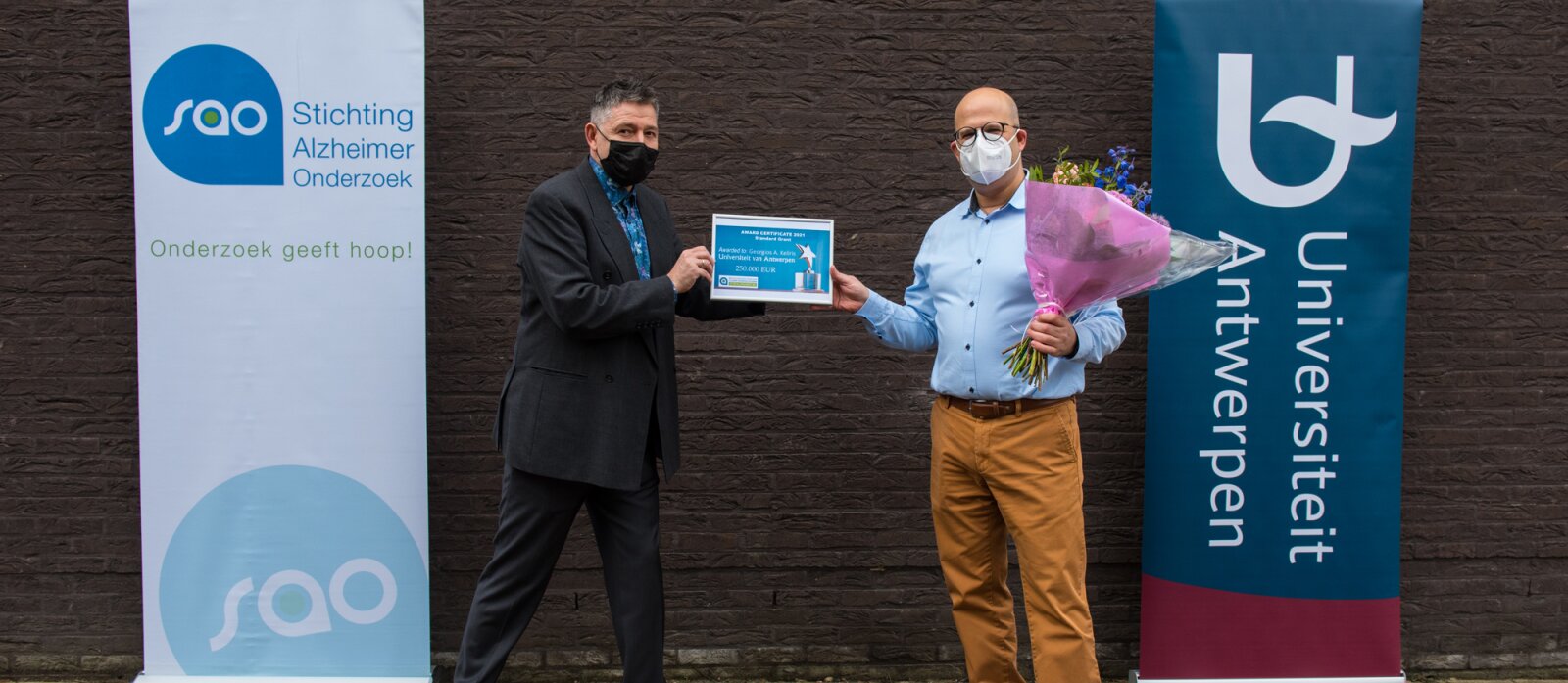Dr. Daniele Bertoglio wins the Laurent Vandendriessche Research Board Award of the University of Antwerp.
Watch the video

Prof. Vincent Timmerman receives award from the Queen Elisabeth Medical Foundation for Neurosciences
Prof. Vincent Timmerman received the Janine & Jacques Delruelle award 2020 from the Queen Elisabeth Medical Foundation (G.S.K.E.) for Neurosciences for his work on 'Unravelling the novel molecular pathways contributing to distal hereditary motor neuropathy caused by mutant HSPB8 with the aim to identify potential therapeutic targets'. The award was presented by Her Majesty Queen Mathilde during an academic session at the Royal Palace in Brussels.
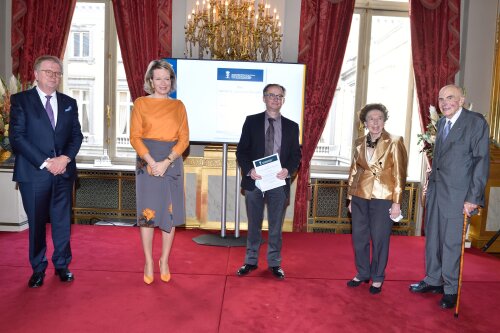
Prof. Sarah Weckhuysen received a grant for her research project 'Study and targeted treatment development for epileptic encephalopathies using 2D and 3D human induced plupripotent stem cell-derived neuronal cultures'.
Photo copyright: Marie-Noëlle Cruysmans
Dr. Daniele Bertoglio wins Young Investigator Award at EMIM 2021
Dr. Daniele Bertoglio, postdoc in the Molecular Imaging Center Antwerp, has received the Young Investigator Award at the European Molecular Imaging Meeting (EMIM) in Göttingen for his work entitled “Longitudinal evaluation of the first mutant Huntingtin PET radioligand as a marker for mHTT lowering therapies for Huntington’s Disease”. Out of 81 applications, three candidates were selected as finalists based on the extensive review outcome. After presenting his work during a dedicated plenary lecture, Dr. Bertoglio was selected as the winner of the YIA 2021.
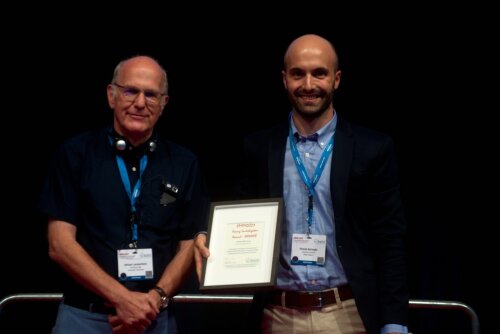
Tamara Vasilkovska, PhD student in the Bio-imaging Lab, received the Poster Award in the category ‘Neuroinflammation and Disease Models’ for her work on “Dynamic, large-scale brain network aberrations in the pre- and manifest disease stages in the Q175 mouse model of Huntington’s disease”.
Progressive mitochondrial dysfunction is a common disease
mechanism in different subtypes of Charcot-Marie-Tooth disease
New work of the group of Prof. Vincent Timmerman has revealed common hallmarks in motor neurons of patients with different subtypes of Charcot-Marie-Tooth disease (CMT) type 2, including impaired axonal transport and mitochondrial dysfunction. Targeting these underlying disease mechanisms could pave the way for treatments that can help a larger group of CMT patients.
The research of Jonas van Lent, PhD student in the Peripheral neuropathies group, was performed in collaboration with the group of Prof. Winnok De Vos (Laboratory of Cell Biology and Histology) and was recently published in BRAIN.
Read the blog article
on the Blog of the Faculty of Pharmaceutical, Biomedical and Veterinary Sciences
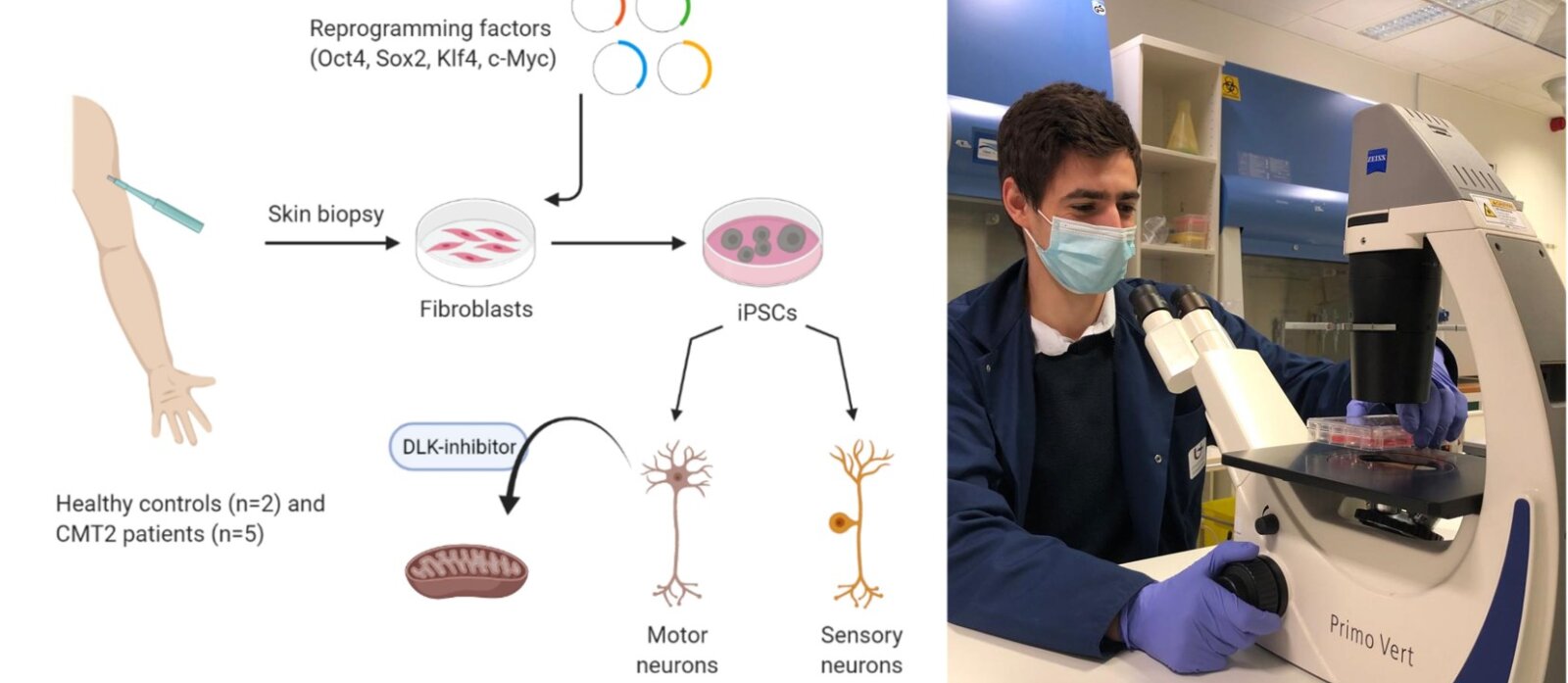
New book - The Pulmonary Neuroepithelial Body Microenvironment: A Multifunctional Unit in the Airway Epithelium.
Pulmonary neuroepithelial bodies (NEB) are sensory receptors in the airway epithelium that can transduce information about changes in the lung environment to the central nervous system. A new book written by the group of Prof. Timmermans and Prof. Adriaensen (Laboratory of Cell Biology and Histology) provides a comprehensive and extensive overview of the available knowledge about the NEB micro-environment (NEB ME). The authors address the different components of the NEB ME, their role in health and disease, highlight NEBs as a potential stem cell niche and discuss multidisciplinary approaches to study different aspects of the pulmonary NEB ME.
The book was written by Dr. Inge Brouns, Dr. Line Verckist, Dr. Isabel Pintelon, Prof. Jean-Pierre Timmermans and Prof. Dirk Adriaensen and is available via Springer.
Read the book
The Pulmonary Neuroepithelial Body Microenvironment
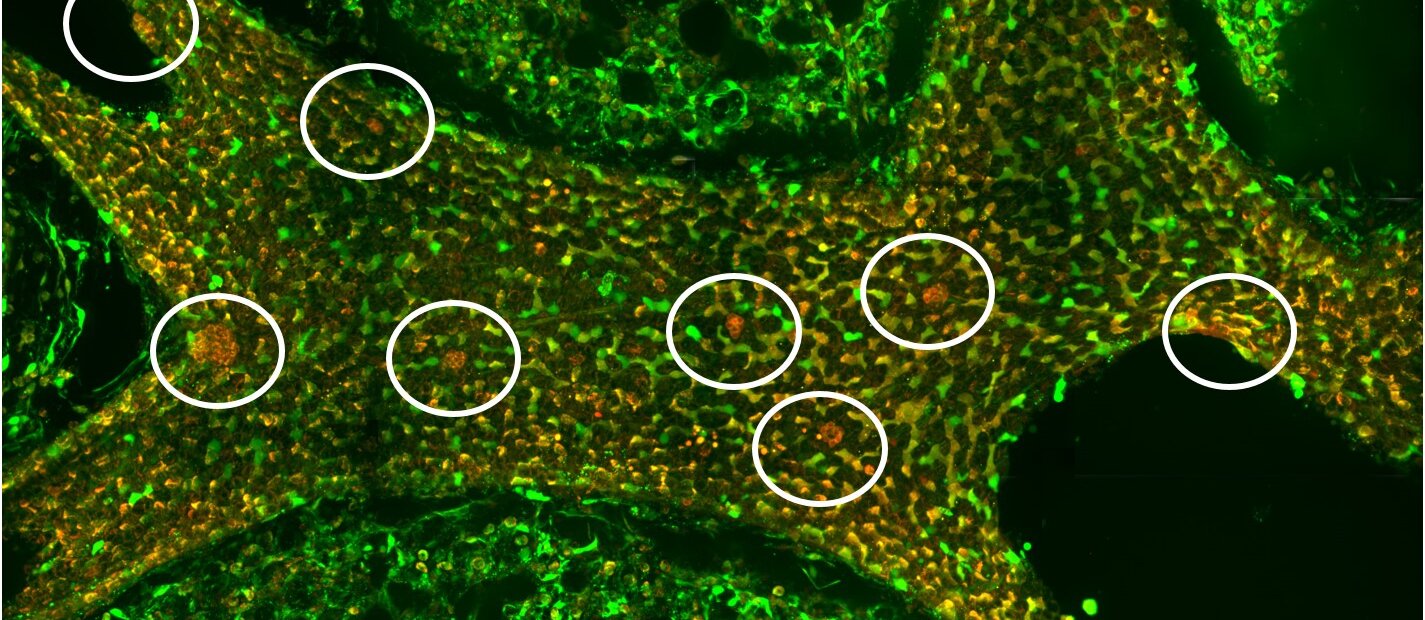
New potential early biomarkers for Parkinson’s disease identified in the mouse gut
In a recent collaboration between the University of Antwerp, the University of Applied Science Kaiserslautern, Saarland University, Heidelberg University, the Brain Mind Institute of EPF Lausanne and the Roche Innovation Centre Basel, the group of Prof. Jean-Pierre Timmermans (Laboratory of Cell Biology and Histology) has identified early alterations in gastrointestinal motility, molecular composition and miRNA expression in the gut of mice with pre-symptomatic Parkinson’s disease. In the future, screening non-invasive gut biopsies for these novel functional and molecular biomarkers may enable early-stage detection of the disease in humans.
The work of this international research consortium was published in Molecular Neurodegeneration.
Read the blog article
on the Blog of the Faculty of Pharmaceutical, Biomedical and Veterinary Sciences
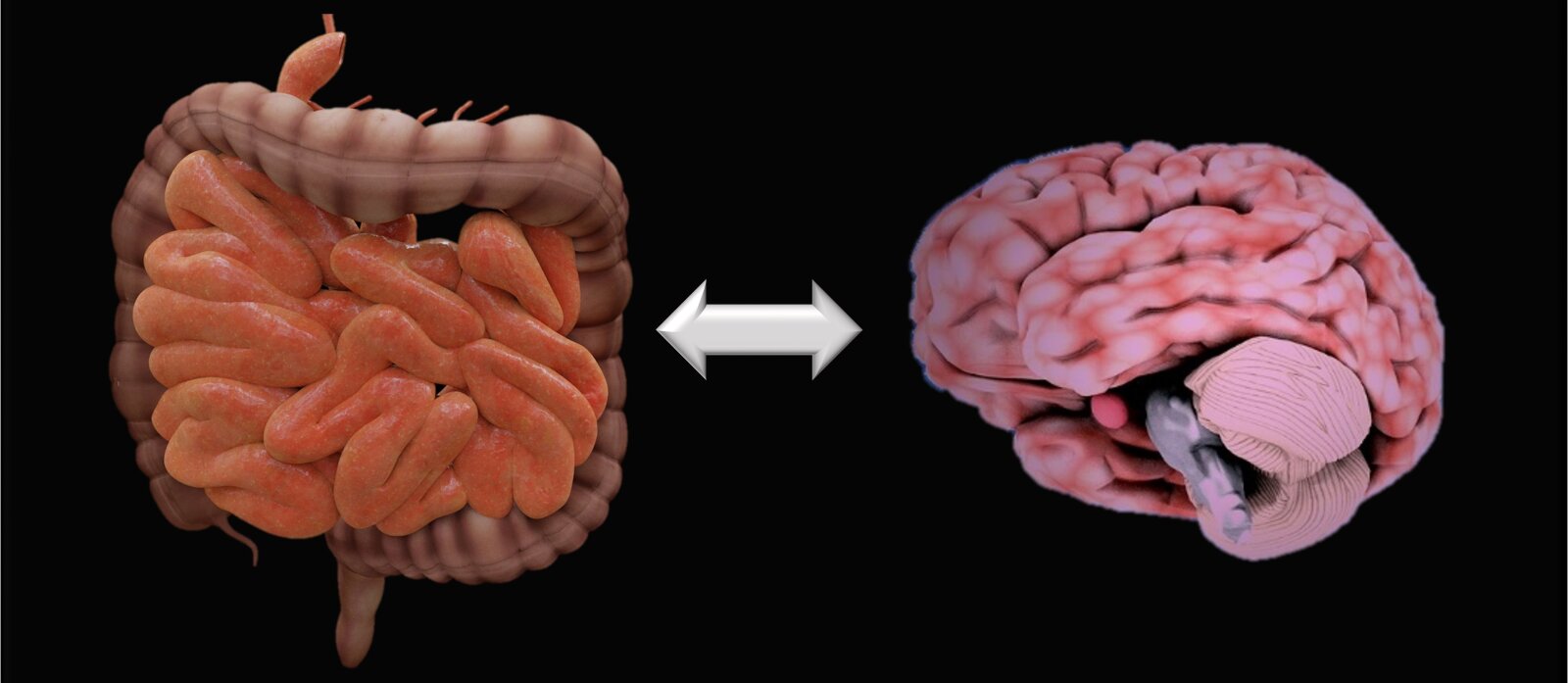

ISMRM Merit Award for Céline Smekens and Quinten Beirinckx
Céline Smekens and Quinten Beirinckx (Vision Lab) received a Magna Cum Laude Merit Award for their work Super-resolution T2* mapping of the knee using UTE Spiral VIBE MRI to be presented at the upcoming International Society for Magnetic Resonance in Medicine (ISMRM) meeting.
At the ISMRM meeting, Nicholas Vidas-Guscic (Bio-imaging Lab) will also present his work In vivo Fixel-Based Analysis of diffusion MRI in manifested Huntington’s disease in the zQ175 HD model.
Dr. Femke Danckaers (imec - Vision Lab) has been nominated for the 2021 New Scientist Scientific Talent Award
Dr. Femke Danckaers (imec - Vision Lab) is one of the 15 nominees for the 2021 New Scientist Scientific Talent Award. The nominees have been selected by a jury from a large number of candidates proposed by Flemish and Dutch universities.
Femke develops statistical shape models to predict how your body looks like in three dimensions (3D). With this technology, she improved bike helmets, discovered how the zebra finch brain changes during breeding seasons and developed a personalized 'avatar' for online shopping (read more (Dutch)).
Vote for Dr. Femke Danckaers
Voting is possible until May 3th 2021 (23:00)

Important changes in the protein structure of a mutated chaperone cause Charcot-Marie-Tooth disease
New research from the Peripheral Neuropathies group (Prof. Vincent Timmerman), in collaboration with researchers from the University of Oxford, has elucidated the structural changes caused by a mutation in the molecular chaperone Hsp27 (HSPB1), involved in Charcot-Marie-Tooth disease.
The work of Dr. Elias Adriaenssens (postdoctoral fellow in the Timmerman lab) was published in EMBO Journal.
Read the blog article
on the Blog of the Faculty of Pharmaceutical, Biomedical and Veterinary Sciences
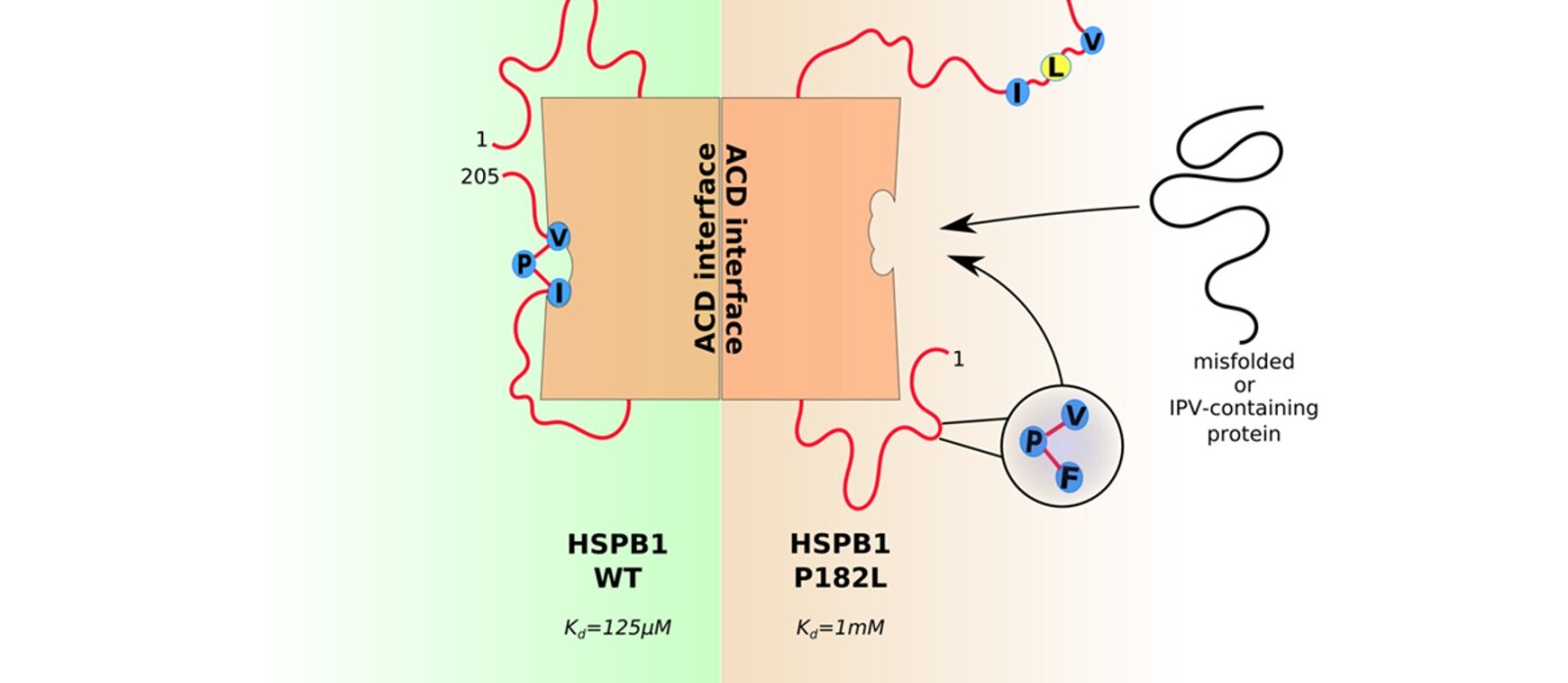
Prof. Keliris receives grant for research on the effects of calorie restriction in Alzheimer's disease
Prof. Georgios Keliris (Bio-imaging Lab) received a grant of 250 000 euros from the Belgian Alzheimer Research Foundation for a unique research project on the possible therapeutic effects of calorie restriction in the fight against dementia. In this project, Prof. Keliris will investigate whether restricting calorie intake has a positive effect on the functioning of brain networks and vascular reactivity.
Read the full news article
on the Bio-imaging Lab website
